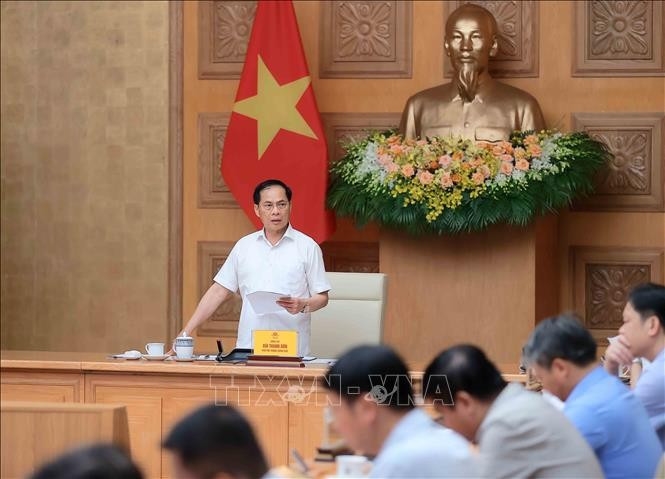He chaired a virtual conference on September 11 with representatives from localities to review the implementation of the Prime Minister's Decision No.768/QD-TTg, dated April 15, 2025, approving the adjusted PDP VIII for 2021-2030, with a vision to 2050.
The adjusted plan was designed to ensure energy security, balance among regions and energy sources, and achievement of economic growth of at least 8% annually during 2025-2030, while meeting public demand. Although the plan was identified as an urgent task, implementation has faced considerable obstacles, particularly in terms of project progress.
    |
 |
|
Deputy Prime Minister Bui Thanh Son speaks at the conference on September 11. |
According to the Ministry of Industry and Trade, it has directed Vietnam Electricity (EVN) and localities to accelerate the development of power generation and transmission projects. Numerous site inspections and meetings have been held, yet overall progress remains slow. In particular, transmission networks for electricity imports from Laos to northern provinces have not been deployed synchronously. Many projects still face administrative hurdles in planning approval, licensing, investor selection, and site clearance.
Local officials discussed challenges and proposed solutions to secure stable power supply, including scaling up rooftop solar power for self-use, expanding concentrated solar power generation combined with battery storage, increasing offshore wind power capacity for 2031-2035, and enhancing investment in transmission infrastructure.
Son emphasized that the top priority is to safeguard energy security and sustainable electricity supply for socio-economic development. He recalled that in 2023, widespread power disruptions significantly affected economic activities, consumption, and investor confidence. While supply has since stabilized, long-term energy security remains under pressure.
Since 2020, the Government has issued 20 resolutions of its regular meetings, and the PM has released eight directives and dispatches, along with many instructions, to demand ministries, sectors, and localities accelerate power supply measures. Nonetheless, progress remains uneven.
The Deputy PM noted that while the adjusted plan sets ambitious targets, actual implementation of power generation and grid expansion is still lagging. The development of clean and renewable energy also remains insufficient.
As socio-economic development targets are very high and the country is strongly attracting investment in high technology, semiconductor, digital transformation, and green growth, which require great energy supply, Son warned of potential electricity shortages between 2027 and 2029 if no swift action is taken to develop foundational and green power sources.
He cited the Politburo's Resolution 70-NQ/TW, dated August 20, 2025, which underscores energy security and demands energy development in advance to meet the evolving needs of economic, social, defense, and security development.
The Deputy PM requested a thorough review of the adjusted plan implementation, including the status of delayed projects, investor selection, and construction progress. He stated that he will personally inspect several projects.
Ministries and localities were directed to ensure timely execution, encourage investor accountability, and complete investor selection by the fourth quarter of 2025.
Finally, he stressed that all administrative barriers must be resolved swiftly, with no projects allowed to stall due to procedural issues. The overarching goal remains to guarantee sufficient electricity for domestic consumption and national development in the new era.
Source: VNA